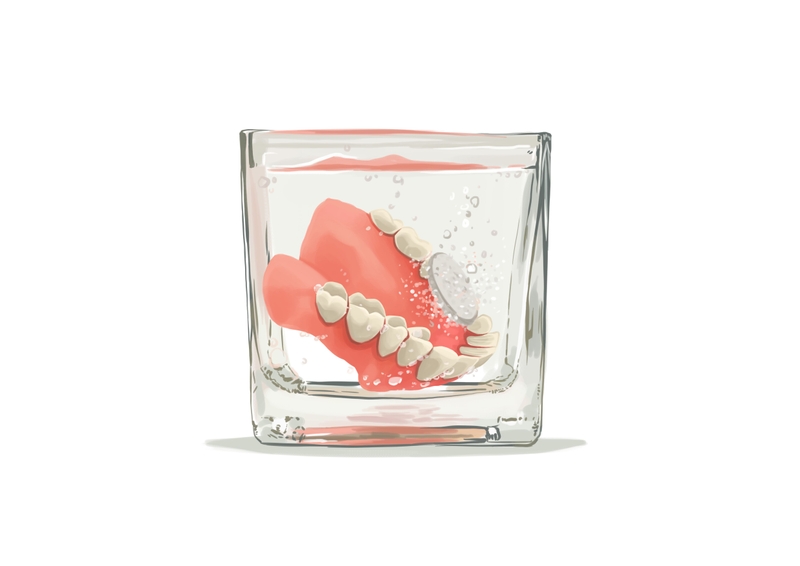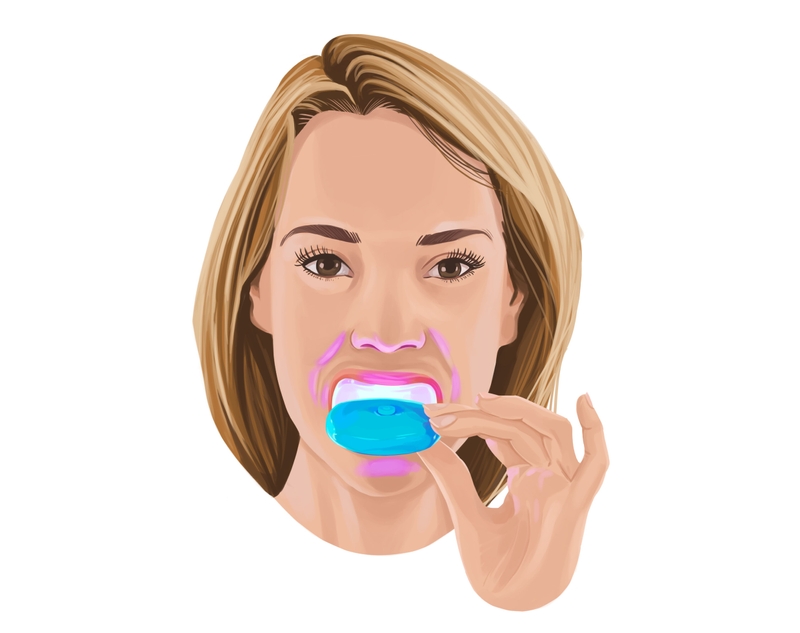- Your dentures can develop stains like natural teeth, but you cannot use conventional whitening agents.
- Do not use abrasive products, hard toothbrushes, or household bleaching products on your dentures. Also, avoid regular toothpaste and hot water.
- You can prevent discoloration by avoiding staining products such as wine, coffee, or tea.
Use Authority Dental to book an appointment for the cheap dentures nearby, or sign up for a dental discount plan and save big on all dental procedures, including dentures.
What are the best ways to remove stains from your dentures? Here's everything you need to know.
Can you whiten dentures?

Picture by Authority Dental under CC 2.0 license
You will not be able to whiten your dentures with the same products you use to whiten your natural teeth. The whitening products on the market, such as toothpastes and whitening strips, are not meant for dentures.
There are other methods you can use to remove stains from your dentures. However, your dentures will never be any whiter than they are when you first get them.
How can I make my false teeth whiter?
Before you try to whiten your false teeth with professional products, you need to clean your dentures. Often, a thorough cleaning can remove light stains and make your dentures whiter.
Clean your dentures each day
Your dentures should be cleaned at least once each day. Remove your dentures and use a denture brush (much larger than a regular toothbrush) to remove any food particles from your dentures. You should clean your dentures on a soft surface or in a sink filled with water so that if you drop them while cleaning, they will not break.
Remember about flossing
You may not need to floss your dentures, but if you have any remaining natural teeth, you should floss them daily. Flossing cleans one-third of your tooth surface, so you will miss much of it if you skip it.
Use denture cleansers
There are many denture cleaners available to purchase. They usually come in the form of a dissolvable tablet that you place in a small glass of water. The cleaner will help remove bacteria and many stains.
Try natural methods
There are several natural methods you can use to remove stains from your dentures. Hydrogen peroxide has strong whitening powers. Apply the solution to your denture, then gently brush it with your denture brush. Be sure to rinse the denture before placing it back in your mouth.
Baking soda and salt can also be used to clean your dentures. Dissolve one of the substances in water and use it to scrub your denture.
Lastly, you can soak your denture in white vinegar overnight. The vinegar will clean your dentures and kill any bacteria. Remember to rinse your denture in the morning.
Get professional cleaning
Even if you are completely edentulous (you have no natural teeth), you should still see a dentist once a year. A dentist will evaluate your denture, gum tissue, and bone levels to ensure they are all healthy.
During your appointment, your dentist will clean your denture using an ultrasonic machine. These machines use short, quick vibrations to clean your denture effectively.
What to avoid when whitening dentures?

Picture by Authority Dental under CC 2.0 license
There are certain products you should avoid when cleaning your dentures. You should not use products that are too abrasive, as they can scratch the acrylic. You should also not use hard toothbrushes or regular toothpaste for the same reason. Household bleach is also definitely a no-no. If you are unsure how to clean your dentures, find a dental technician in your area for professional assistance.

Lastly, while you can use warm water to rinse and clean your denture, never use hot water or boiling water. Heat can melt the acrylic, causing your denture to warp.
To prevent your dentures from staining, you should avoid foods or drinks that cause natural teeth to stain. This includes wine, coffee, and tea, among other things. If you do consume these things, always rinse your dentures with water when you are finished.
Lee emphasizes: "The key is not whitening, it is stain prevention and gentle cleaning. A good daily soak in a denture-specific cleanser is the only safe way to lift surface stains and restore the original brightness without harming the material."
FAQ
Why do dentures get discolored?
Dentures can discolor for the same reasons your natural teeth do. Acrylic, which dentures are made of, can easily absorb substances. Foods or drinks that would stain your natural teeth will stain your denture even more quickly.
Can you change the color of your dentures?
When you first get your dentures, your dental provider will ask you which shade you would like the teeth to be. Once you have the final dentures, you cannot change the color of the teeth without getting new ones.
Is it safe to use household bleach to whiten dentures?
It is not safe to use household bleach to whiten your dentures. You should only use natural products or products approved for use.
Harry Lee, DMD
One of the most common questions my denture patients ask is, "How can I whiten my dentures? They have started to look yellow." It is a natural question, but the answer often surprises them: you cannot actually "whiten" a denture, and trying to do so can permanently ruin it.